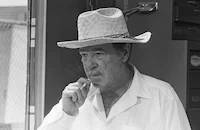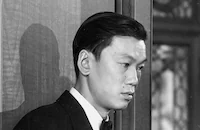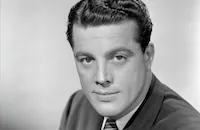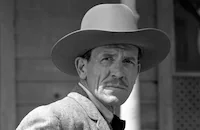First Yank into Tokyo

Brief Synopsis
Cast & Crew
Gordon Douglas
Tom Neal
Barbara Hale
Marc Cramer
Richard Loo
Keye Luke
Film Details
Technical Specs

Synopsis
After staging a successful bombing raid on Tokyo, pilot Steve Ross returns to San Francisco, where he reminisces about his lost love, army nurse Abby Drake, who he believes perished while on duty in Bataan. Steve's leave is curtailed when he is ordered to report to Washington and asked to volunteer for a special mission. Because Steve was reared in Japan and is fluent in the language, the army proposes that he undergo plastic surgery to become a "Japanese" so that he can infiltrate the army and contact scientist Louis Jardine, a prisoner of war who possesses the formula to build an atom bomb. Steve accepts the mission and after the surgery is sent to a city near Hong Kong, where he becomes known as Sergeant Takishima, a Japanese soldier who is being shipped back to Japan after being discharged for battle shock. As Steve's ship nears Tokyo, he jumps overboard and, after swimming ashore, walks to the Kamuri concentration camp, where Jardine is being held prisoner. At the camp, Steve is assigned to work at the supply depot and there meets Haan-Soo, a Korean errand boy who is a member of the underground working with the U. S. When Haan-Soo tells Steve that Jardine has been hospitalized with black fever, Steve gets himself reassigned to the hospital by bribing Major Nogiea, the medical director who has been pilfering hospital supplies. Steve's assignment must be approved by Colonel Eco Okunura, the perceptive camp commander, who was also Steve's college roommate. Okunura fails to recognize his old roommate, but is certain that he has met the new soldier somewhere before. At the supply room, Steve encounters Abby, who has been captured by the Japanese and assigned the position of head nurse at the hospital. When Jardine, who has been working at the munitions plant, returns to the hospital that night, Steve contacts him. At first Jardine doubts that the Japanese soldier is really an American agent, but Steve convinces him. Soon after, Okunura makes an advance toward Abby, and when she rejects him, he takes revenge on Nogiea, who has also tried to seduce the nurse. Accusing Nogiea of larceny, Okunura demotes him and then orders him to commit suicide. After Nogiea complies, Okunura accuses the nurses of his murder and orders Abby to report to his office. There, Okunura again tries to seduce Abby but is interrupted when Steve arrives with proof of Nogiea's suicide, thus freeing Abby to leave. Okunura orders Steve whipped for his insubordination, and as Abby tends to his wounds, she experiences confusing emotions toward him. Later, Steve confesses to Jardine that he and Abby were engaged and the pilot's wings she wears are his. Although the plan had been for Jardine to transmit the data to Steve, Steve decides that he, Abby and Jardine must all escape quickly before the tenacious Okunura uncovers his identity. An escape plan is devised for that night, but when Haan-Soo learns that Okunura has sent for Takishima's former commander to verify his identity, Jardine suggests setting an explosion at the munitions factory as a diversion. As Haan-Soo leaves for the plant, Okunura summons Abby to a party at his house. Under the ruse of delivering an officer to the party, Steve drives to the commander's house with Jardine hidden in the backseat of the car. At the house, Okunura has sequestered Abby in a room and is about to rape her when he sees Steve being chased across the lawn by a watchdog. Recognizing Steve as his old roommate by the way he sprints, Okunura exposes him to the assembled officers and is about to kill him when the munitions plant explodes, throwing Okunura and the others to the floor. After strangling Okunura, Steve rescues Abby and reveals his true identity to her. With the officers in pursuit, Steve, Abby and Jardine flee to the beach, where they are to be rescued by a boat. There, they are met by Haan-Soo, who joins Steve in holding off the soldiers while Abby and Jardine sail to safety. Steve and Haan-Soo's sacrifice allows for the development and deployment of the atomic bomb, assuring that "mankind can walk unafraid in peace with goodwill toward men."

Director

Gordon Douglas
Cast

Tom Neal

Barbara Hale

Marc Cramer

Richard Loo

Keye Luke
Leonard Strong

Benson Fong
Clarence Lung
Key Chang

Michael St. Angel
Edmund Glover
Robert Clarke
Johnny Strong
Eden Nicholas
Jimmy Jordan
Bruce Edwards
Wong Artarne
Larry Wong
Albert Law
Gerald Pierce
Harry Anderson
Ralph Stein
Selmar Jackson
Dorothy Curtis
Noreen Lee
Gwen Crawford
Betty Gillette
Frances Haldorn
Ione Reed
Aline Goodwins
Bobby La Salle

Russell Hicks

John Hamilton
Wallis Clark

Kenneth Macdonald
Joseph Kim
Beal Wong
Paul Fung
Bob Chinn
Chet Voravan
Richard Wang
Tommy Lee
Bo Ching
George Lee
Peter Chong
Edwin Luke
Thomas Quon Woo
Weaver Levy
George Chung
Spencer Chan
James Leong
Crew
Gladys Atwater
C. Bakaleinikoff
J. Robert Bren
J. Robert Bren
J. Robert Bren
John L. Cass
Albert S. D'agostino
Jack J. Gross
Leigh Harline
Walter Keller
Philip Martin Jr.
Charles Nields
Sam Ruman
Maurice Seiderman
Darrell Silvera
R. Andrew Smith
James G. Stewart
Vernon L. Walker
Harry J. Wild

Photo Collections
Film Details
Technical Specs

Articles
First Yank into Tokyo
The outlandish plot follows Major Steve Ross (Tom Neal) as he volunteers for an undercover mission behind enemy lines that requires him to alter his face via plastic surgery in order to pass as a Japanese soldier. The surgeon cautions him, "I feel it is my duty to again warn you that once your features are changed, they can never be changed back." So why does Ross do it? To gain access to Captain Andrew Kent (Michael St. Angel), a captured American physicist who was working on the formula for the atomic bomb. It's no secret that Ross speaks fluent Japanese (from residing there in 1936) so he's clearly the perfect man to infiltrate the concentration camp where Kent is held. Regarding the enemy, Ross tells his superior, "I think I know every kink in their corkscrew psychology, sir." But there are two developments he didn't count on - running into his former fiancee Abby (Barbara Hale) at the camp (he thought she was killed in Bataan) and encountering his former Japanese roommate Okaruna (Richard Loo) from college, now an insidiously evil camp commandant. It turns out that Abby was captured and placed in the camp to tend to the American prisoners. Of course, neither she nor Okaruna recognize Ross in his new identity but there is something so familiar about him that disturbs them both. Oh, we forgot to tell you the most important part. The sinister Okaruna has designs on Abby who is now in love with Kent - all of this being observed by Ross who stands by, waiting for the right moment to spring Kent from the camp.
First Yank in Tokyo has enough plot contrivances for ten films but director Douglas juggles them all so effectively and with such breathless pacing that you rarely have time to consider the implausibility of the basic premise. And the film's blatant anti-Japanese posturing along with Tom Neal's crazy slant-eyed makeup, several nutty flashback sequences and unsubtle stock footage inserts provides a measure of politically incorrect fun that should come as a surprise to anyone who was expecting a conventional war drama. At times, First Yank in Tokyo degenerates into pure camp with dialogue exchanges like the plastic surgeon telling Ross, "You're as perfect a Jap as we can turn out." And the film is chock full of racial stereotypes with all the Japanese characters depicted as deceitful, sadistic, arrogant and fond of pithy sayings like "Your country is an overripe plum. It will be shaken to the earth by the winds sweeping from Japan." If nothing else, you have to love the frantic climax which borrows brilliantly and shamelessly from the airport farewell in Casablanca (1942) and the machine-gun fadeout of Bataan (1943).
Interestingly enough, First Yank in Tokyo went through some last minute changes before it was released. The studio wanted to make it more topical, due to recent events, so Captain Kent, the American prisoner, was transformed into a scientist who holds the formula to the atomic bomb thus justifying the final shot of the famous mushroom cloud. The film is also unique in that it makes a reference to the Bataan Death March, a notorious event which was only referenced in one other American war movie, Back to Bataan (1945).
Producer: J. Robert Bren
Director: Gordon M. Douglas
Screenplay: J. Robert Bren, based on a story by Gladys Atwater & J. Robert Bren
Art Direction: Albert S. D'Agostino, Walter E. Keller
Cinematography: Harry J. Wild
Editing: Philip Martin
Music: Leigh Harline
Cast: Tom Neal (Major Ross), Barbara Hale (Abby Drake), Richard Loo (Col. Okaruna), Keye Luke (Haan-Soo), Leonard Strong (Maj. Nogira), Benson Fong (Captain Tanahe), Michael St. Angel (Captain Kent).
BW-83m.
by Jeff Stafford

First Yank into Tokyo
Quotes
Trivia
The war ended before filming was completed. Because of this the producers decided to rewrite the script to include references to the atomic bomb, including a side plot involving a kidnapped American nuclear physicist.
Notes
The working title of this picture was First Man into Tokyo. The film credits open on an iris shot of a map of Japan. As the lens slowly opens, the map spreads over the entire screen and production credits. The film's closing shot of the mushroom cloud produced by the atomic bomb was added after the film was completed, according to the Variety review and a news item in the Hollywood Reporter. When the bomb was dropped on Hiroshima on August 6, 1945, approximately five months after filming was completed, the script was rewritten to include footage of the attack on Hiroshima and Nagasaki and the closing narration extolling the virtues of the bomb was added. According to Time, the bomb footage, supplied by the war department, consisted of practice explosions that were detonated in New Mexico. This was writer J. Robert Bren's first assignment as a producer and director Gordon Douglas' last picture for RKO. Technical advisor R. Andrew Smith was a former professor at the University of Tokyo, according to a news item in Hollywood Reporter. Motion Picture Herald adds that the world premiere in San Francisco was attended by servicemen who had been POW's in Japan.















